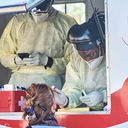New COVID variant concerns South African scientists

Scientists in South Africa have identified a new COVID-19 variant featuring "a very unusual constellation of mutations" that could potentially drive another wave of cases, officials warned on Thursday.
Why it matters: The variant, known as B.1.1.529, has so far been found in Botswana, South Africa and Hong Kong, in a traveler, but could soon spread "all over," South African health minister Joe Phaahla said.
- Tulio de Oliveira, a professor and geneticist who has studied viral coronavirus variants, said in a briefing that the variant has more than 30 mutations and is "clearly very different" from known variants.
- De Oliveira also said that the number of mutations was concerning and could allow the variant to evade immune systems.
The big picture: The new variant "likely evolved during a chronic infection of an immuno-compromised person, possibly in an untreated HIV/AIDS patient," Francois Balloux, director of the UCL Genetics Institute, said in a statement.
- Officials from the World Health Organization could assign the variant a Greek letter as soon as Friday, when the group will meet to discuss the findings, de Oliveira said.
By the numbers: South Africa has started to see an increase in COVID cases, especially in Gauteng, the country's most populous province.
- More than 1,200 cases were identified in the country on Wednesday, up from days when closer to 100 cases were reported earlier this month.
What they're saying: “Here is a mutation variant of serious concern,” Phaahla said. “We were hopeful that we might have a longer break in between waves — possibly that it would hold off to late December or even next year January.”
- “You can be rest assured that as people move in the next coming weeks, this [variant] will be all over,” Phaahla added.
- "This variant did surprise us and it has many more mutations than expected," de Oliveira said. "It is spreading very fast and we expect to see pressure in the healthcare system in the next few days and weeks."
The bottom line: De Oliveira said the full significance of the variant is uncertain but that vaccines remain a "critical tool to protect us against severe disease."